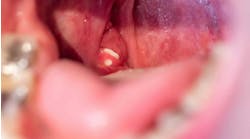Dear RDH:
Your article printed in the March 2012 issue titled, "Periodontal referral gone awry," really strikes at the heart of what seems to be happening today in dentistry.
I've been a practicing dental hygienist for over 27 years, and I can tell you that I've been put in a compromising position regarding patient care more than just a few times. Even though dental hygiene education includes training in soft tissue management procedures, some hygienists have more extensive training than others, and some dentists provide more up-to-date equipment and materials for their hygienists, which allows them to administer the best care possible. For those who are forced to use substandard equipment along with no access to any of the adjuncts that might help facilitate a positive outcome, providing scaling and root planing (SRP) at a high competency level can be challenging at best.
Simply knowing how to scale subgingivally is not enough. If dentists prefer to provide periodontal treatment services in their practice, providing the hygienist with the tools and equipment needed for proper periodontal treatment would go a long way in facilitating a successful treatment outcome. The dentist should also be willing to recommend periodontal referrals when warranted.
I believe Dr. Bleckstein is spot on in his assessment of patient trust. Patients trust their doctors. They believe in their expert opinions and if dentists misuse that trust by failing to provide patients with all available treatment options, then our profession is failing miserably. Quality patient care should always be the first priority in any dental office, with monetary considerations falling in behind. Unfortunately, it seems over the last several years, those priorities have become catawampus.
One of the interesting points that Dr. Bleckstein makes is the difference in the number of hours of training in periodontics between general dentists (295 hours), dental hygienists (2,700 hours), and periodontists (5,560 hours). This point especially hits close to home for me. Not only have I clocked those basic in-school hours of training, but I've also had 27 years of full-time practice to hone my skills. Although hygienists are not legally allowed to diagnose in my state, our experience and training should be taken into consideration by the dentist before he or she makes the final decision regarding periodontal treatment and/or referral.
I especially appreciate Dr. Bleckstein's inclusion of the statement, "This assignment may conflict with the RDH's clinical judgment or sense of professional ethics, but it must be followed or the RDH faces possible termination of employment." In the practice where I work, I have had many patients whom I felt would be better served with a periodontal referral. I see many patients who haven't been to a dentist in years and present as difficult class IV periodontal cases. I have been told that I must perform full-mouth periodontal SRP on these patients before we send them to a specialist because "the periodontists don't like us to send them patients with dirty teeth!"
There are many competent dental hygienists working in general practices who are perfectly capable of performing periodontal treatments. However, I believe that if the clinical outcomes are less than desired, it is the ethical responsibility of the dentist to refer them to a specialist, and also to have the fortitude to refer them at the onset of treatment if their periodontal condition is such that the treatment outcomes are questionable. Thanks for bringing this subject into the limelight, RDH!
Sondra Roberts, RDH, BS
Andersonville, Tennessee
Dear RDH:
Reading JoAnn R. Gurenlian's column, "Clinging to dinosaurs" (March 2012 issue), brings to mind my past experience as an examiner helping with the Washington State dental hygiene boards.
I wish it would be a simple matter to abolish the boards across the nation and just leave it to the schools. But it's not that simple. Many candidates come from other states that do not allow hygienists to perform certain procedures, particularly anesthesia and restorative. Determining their proficiency in these areas is important to the safety of the public when they move to another state. It would be nice if all instructors in all schools were completely ethical, but that's not reality. Even with the board exams, there are instructors who personally pre-prep students' patients, pick, choose and grade their favorite student's clinical work, and are not proficient themselves in the clinical procedures they are trying to teach.
One such school sent approximately 20 students to the boards and only five of those students passed. I remember one candidate who was attempting to perform a posterior superior alveolar injection and placed the needle in a location of the mouth completely adverse to that injection. She didn't pass the boards.
Public safety was utmost in the minds of my fellow examiners and even though we were testing to minimum competency, we had an earnest desire to assure that safety was preserved. Much time was spent on calibration of the examiners, because we wanted to be fair to the candidates and be consistent in our desire to pass them while testing to the expected proficiency. But sometimes it seemed like there was a disconnect beween instructors and their recognition of the necessity for an examination of students outside the classroom environment that confirmed their safety.
I had nothing but deep respect for my fellow examiners and their sincerity in wanting the candidates to succeed, and knowing what a heavy responsibility they had to the public. I believe the board clinical examination is an important step in the proficiency of the dental hygiene student, which confirms the safety of their delivery of services to the public. Perhaps other medical professions need to follow that example.
Carol Levanen, CDA, RDH
Yacolt, Washington







